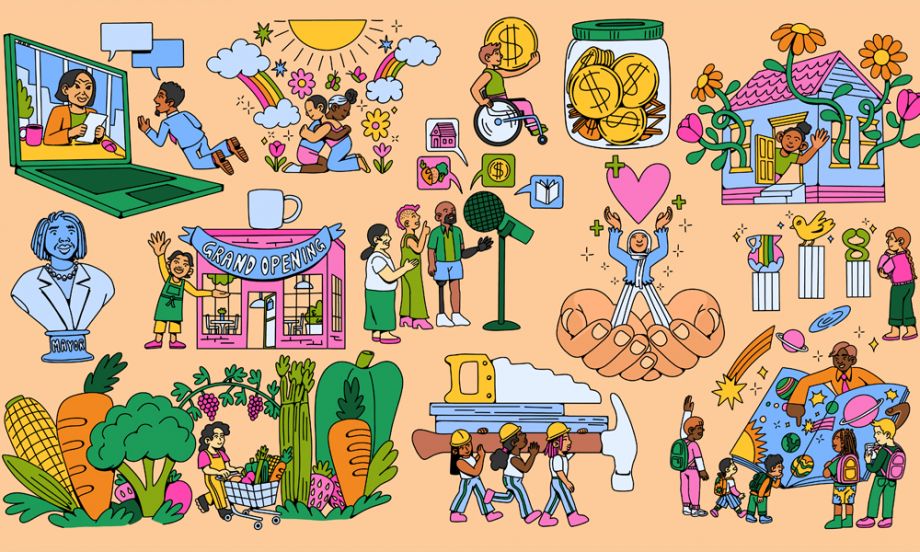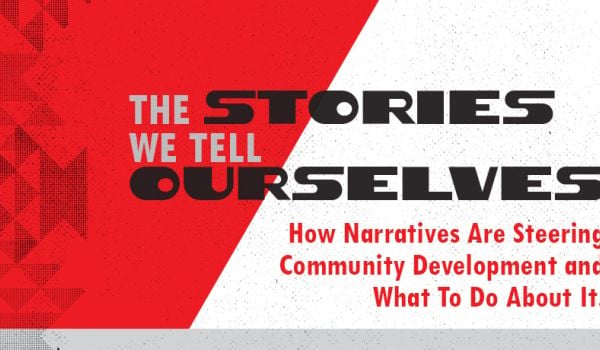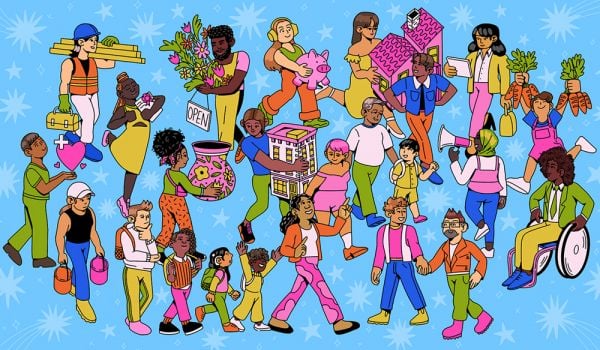In my journey from a community development funder to a practitioner, I saw that many of us don’t fit within traditional definitions of community development. That exclusion is not by chance; it is intentional. The community development ecosystem is hyper-professionalized and disproportionately focused on housing development resulting in a narrow, exclusionary definition of the field and underrepresentation of diverse experiences and perspectives among practitioners. When we work within narrow definitions of community development, and thus develop narrow solutions, we perpetuate racist practices.
ThirdSpace Action Lab was born out of an understanding that one-size solutions to specific, endemic issues doesn’t work in community development. Our sector has worked hard to standardize, to “build capacity”, to “model best practices”, to make our work uniform, sterile, and above all, neutral. Neutrality, however, doesn’t acknowledge that folks don’t experience equity in service provision. Neutrality doesn’t honor the history or culture or assets unique to Youngstown or Selma or Oakland. Neutrality reinforces the comfort of the powerful and reduces our collective capacity to hold ourselves + others in community development accountable. I am calling for my peers in race-conscious community development to be more radical, more direct, more connected, and most importantly, more accountable. So what does accountability in community development look like? I’m glad you asked.
Accountability in Community Development
Experimentation
We have been socialized to believe that the problems are just too big and that there are no viable, innovative solutions or ideas, but rather the status quo approaches will solve issues over time. We have to name this falsity and tap into our most radical imagination and commit to experimenting with new ideas and reconsidering old ones. We must reject the American notion of rugged individualism and embrace Nguzu Saba principles like unity, collective work, responsibility, and creativity. Our Anti-Racist Community Development research found that the sector needs to create “infrastructure that increases capacity and knowledge sharing about cross-sector work and policy reforms that knock down statutory + process barriers that keep work siloed,” to create this kind of space for creativity.
Recommitment
Community development is driven by invisible hands that are not accountable to communities and their residents. When community development over-emphasizes “technical experts far removed from lived community experience”, it reinforces patterns of paternalism and often misses the abundance of assets that exist even in places that have been chronically under-supported. We must rediscover the beauty and what makes our communities unique and then recommit and invest in our communities to recreate places we’re proud that we can live, work, play and grow old in.
Sacrifice
Sacrifice is essential if we want to see change in our communities. It may mean waiting in long lines to vote; attending city council meetings; paying Black, Indigenous, and Latino businesses more for their services or goods to allow them to compete; helping neighbors maintain their lawn; or boycotting stores that mistreat residents the list goes on. But if enough of us do some of these things, we will see results. Steps like these are the building blocks for a collective future. Our trusted ecosystem of community development practitioners often reference the Black Power Movement’s “emphasis on community development as a vehicle for self-determination and for intentional disruption of past racist approaches to policy making”.
I feel strongly that there can be joy in every step of this process; in fact, our survival relies on us experiencing joy in struggle and celebrating our creativity and resilience. I find joy in problem solving, and in that joy, I am free to dream, to exercise my radical imagination. As a Black woman, I dream of being released from the responsibilities of being studied and therefore exceptional; I’m cool with being regular. Radical imagination allows a reprieve from the status quo. It gives us something to work towards, instead of something to withstand.
The author is responding to the findings shared in the Anti-Racist Community Development Research Project, produced with support from the Robert Wood Johnson Foundation (RWJF) to increase understanding of structural racism in community development and pathways to racially equitable outcomes that promote health equity. The views expressed in this article do not necessarily reflect the views of RWJF or ThirdSpace Action Lab.
© 2023 Robert Wood Johnson Foundation
Evelyn Burnett is co-founder of ThirdSpace Action Lab. She previously served as VP of Economic Opportunity, at Cleveland Neighborhood Progress, and Associate Director with Admiral Center at Living Cities. Evelyn holds a Bachelor of Arts in Business and Organizational Communications and a master’s degree in Public Administration from The University of Akron.



_600_350_80_s_c1.jpeg)







